 |
 |
 |
 |
| |
||||
Fighting for a Miracle 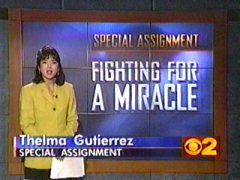 The pace is feverish, the stakes are high. CBS 2 News takes you on a journey of life's triumphs and defeats. The pace is feverish, the stakes are high. CBS 2 News takes you on a journey of life's triumphs and defeats. The patients you're about to meet are among the most delicate and vulnerable. Their cries fill one corner of the Martin Luther King-Drew Medical Center. The cries come from special patients called "preemies." Preemies are premature babies who are born too soon. And these babies' lifelines are the doctors and nurses who work in the neonatal intensive care unit. Special Assignment: Fighting for a Miracle aired Sunday, November 2, 1997 at 11:00 p.m. Baby Martinez is only four days old. He was born two months before his due date. Baby Martinez is so fragile, it will be at least another month before his mother can even hold him, said Gutierrez. But as bleak as that may sound, there is hope. After spending a week in the neonatal intensive care unit (NICU), CBS 2 News was amazed to learn that babies who weigh only two pounds actually have a good chance of living healthy, normal, productive lives. Medical advancements have made it possible to even keep one-and-a-half pound babies alive, said Gutierrez. The drug sufactant, helps the underdeveloped lungs of premature infants expand and function. Still some babies will remain in NICU for months, and each day is a struggle. When asked whether the babies felt pain, Dr. Supnet replied, "Yes, they feel pain. We give them medicine (morphine) to ease the pain." Despite having the technology to keep them alive, doctors must still face a difficult choice: should some of these babies be kept alive? "Those are the decisions we discuss with doctors and parent," said Dr. Supnet. One of those parents is Alfred Milton. His daughter, Destiny, weighed only two pounds at birth, said Gutierrez. "When I first saw (Destiny) she was all wrinkled and old looking," said Milton. Since then, Destiny's appearance has changed a lot, said Gutierrez. Destiny's already been in the neonatal ICU for one month. "I was scared I was going to hurt her," said Milton. "I have big hands, I'm a construction worker. I didn't want to hurt her. I was scared to pick her up." The nurses will tell you that has changed too. Milton visits Destiny without fail, three times a day, and they say his touch is her best medicine, Gutierrez said. Each day the King Drew-Medical Center brings on new challenges for the neonatal team. Time was running out for Camy so her doctors decided to induce labor, said Gutierrez. With her husband Max at her side, the Camy's baby was born. It was a boy. The team moved quickly. They knew the baby couldn't breathe on his own, said Gutierrez. The Camys waited anxiously for the test results, as baby Camy was rushed to the stabilization area. He weighed in at only a pound-and-a-half. The test results came back -- the baby had no lungs. But this is the other side of the story, said Gutierrez. Eighty-seven percent of all preemies born at King-Drew will live. "The feeling that you have in there for (saving a baby)�there is no amount of money or material goods that can give you this feeling, " said Dr. Supnet. "It is very rewarding." Destiny, now weighs three pounds, 16 ounces -- that's more than she ever weighed at birth, and now she's just one pound away from going home. Her name says it all. It was her destiny to be born and her destiny to live. For more information:
|
||||||||||

|
||||||||||

 |
||
|
12 p.m.
Woman 2 Woman One of the stars from "Judging Amy" 5 p.m. 6 p.m. 11 p.m.
|
||
 |
||
|
4-5 p.m.
Judge Judy Ruler Of The Free World! 8:00 p.m. 8:30 p.m.
9:00 p.m.
|
||
| |
||
 Dr. Xylina Bean and Dr. Medaro Supnet are neonatologists. Each day they lead a team of specialists to do the seemingly impossible -- to save the lives of human beings so tiny they should be in their mother's wombs, said CBS 2 News'Thelma Gutierrez. But instead their premature bodies struggle to survive in isolettes, attached to monitors, tubes and probes.
Dr. Xylina Bean and Dr. Medaro Supnet are neonatologists. Each day they lead a team of specialists to do the seemingly impossible -- to save the lives of human beings so tiny they should be in their mother's wombs, said CBS 2 News'Thelma Gutierrez. But instead their premature bodies struggle to survive in isolettes, attached to monitors, tubes and probes. 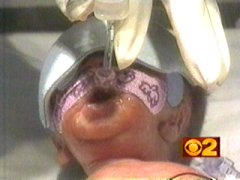 High-frequency ventilators breathe for these babies and reduce the amount of trauma to their lungs. High-tech monitoring equipment like an ultrasound machine show specialists what is going on without invasive surgery.
High-frequency ventilators breathe for these babies and reduce the amount of trauma to their lungs. High-tech monitoring equipment like an ultrasound machine show specialists what is going on without invasive surgery. 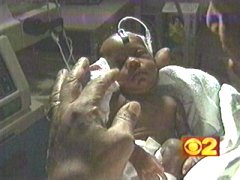 Milton's wife, Joyce, suffers from hypertension. She had the baby two months ahead of schedule.
Milton's wife, Joyce, suffers from hypertension. She had the baby two months ahead of schedule. 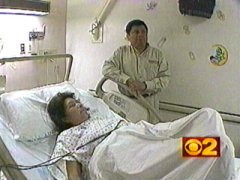 Estrella Camy was only 25 weeks into her pregnancy. According to Gutierrez, Camy had lost all her amniotic fluid and the baby was showing signs of distress.
Estrella Camy was only 25 weeks into her pregnancy. According to Gutierrez, Camy had lost all her amniotic fluid and the baby was showing signs of distress. 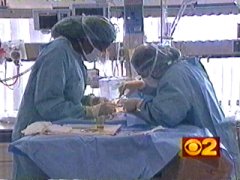 With Dr. Bean and Dr. Supnet leading a team of more than ten doctors and nurses, every effort was made to save the baby. But after more than four hours of tryng to save baby Camy, the doctors determined that the baby wouldn't have lived more than 30 minutes at the most.
With Dr. Bean and Dr. Supnet leading a team of more than ten doctors and nurses, every effort was made to save the baby. But after more than four hours of tryng to save baby Camy, the doctors determined that the baby wouldn't have lived more than 30 minutes at the most. 

